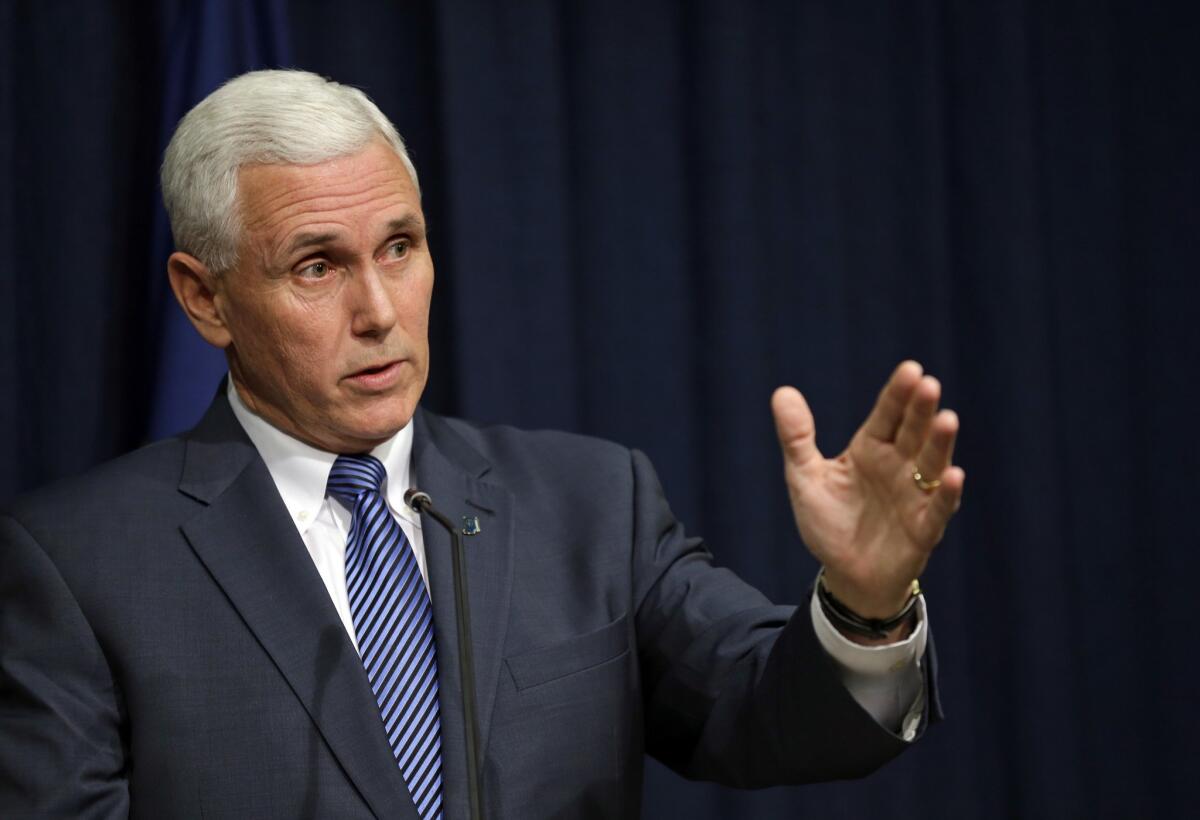Prospective White House candidates tussle over Indiana religious law

- Share via
Reporting from San Francisco — The controversy over Indiana’s religious freedom law has opened a new — and predictable — divide in the 2016 presidential race, as Republicans rise to its defense and Democrats condemn the legislation as discriminatory against gays and lesbians.
Former Florida Gov. Jeb Bush, who is viewed with suspicion by many social conservatives for, among other things, supporting the national Common Core education standards, on Monday issued a full-throated defense of the law and the governor who signed it, fellow Republican Mike Pence.
“This is simply allowing people of faith space to be able to express their beliefs. To be able to be people of conscience,” Bush said in an interview with conservative radio show host Hugh Hewitt, noting that his home state has a similar law. “I think once the facts are established, people aren’t going to see this as discriminatory at all.”
Florida Sen. Marco Rubio, another all-but-declared GOP candidate for president, echoed Bush’s support, saying the Indiana law was intended to ensure citizens the right to act on their religious beliefs, not to harm gays and lesbians.
“I think people have the right to live out their religious faith in their own lives,” Rubio said Monday on Fox News. “And when you’re asking someone who provides professional services to do something, or be punished by law, that violates their faith, you’re violating that religious liberty they have.”
On Thursday, Pence signed the Religious Freedom Restoration Act, which allows business owners -- a florist, for instance, who opposes same-sex marriage -- to refuse services to certain people if it violates their religious beliefs.
Nineteen other states have similar laws, but Indiana’s has provoked an especially fierce backlash on social media and criticism nationally from a number of business and civic leaders as well as groups that have threatened boycotts and other protests to punish the state.
Shortly after Bush’s remarks, Republican Sen. Ted Cruz of Texas, who last week formally announced his presidential bid, issued a statement hailing Pence for “holding the line to protect religious liberty in the Hoosier State.”
Wisconsin Gov. Scott Walker, another all-but-certain Republican White House hopeful, issued a more vaguely supportive statement. “As a matter of principle, Gov. Walker believes in broad religious freedom and the right for Americans to exercise their religion and act on their conscience,” said spokeswoman Ashlee Strong.
Democrats have been quick to criticize Pence and the Indiana law. Democratic front-runner Hillary Rodham Clinton condemned the measure in a tweet sent last week — though Republicans have pointed out her husband, Bill, signed federal legislation in 1993 that served as a model for some state religious freedom laws.
Speaking Monday night in San Francisco, independent Vermont Sen. Bernard Sanders — who is weighing a 2016 run for the White House as a Democrat — joined the chorus of criticism.
“The governor of Indiana absolutely is on the wrong side of history,” Sanders said in a response to a question from the audience during an appearance at the Commonwealth Club, a nonpartisan civic affairs group.
Citing the boycott threats Indiana has received, Sanders said state lawmakers who passed the bill “may be rethinking their position and I certainly support that.”
At a Tuesday campaign stop in New Hampshire, former Democratic Maryland Gov. Martin O’Malley weighed in as well, slapping at Republicans who backed Pence and the Indiana measure.
“I think it is shameful that presidential candidates in this day and age would try to give cover to a law ... that attempts to give license to discrimination of gay and lesbian people,” O’Malley, who is mulling a 2016 run, told reporters. “It’s wrong. It’s not who we are as a people.”
Facing growing protests, Pence on Tuesday called for a legislative fix this week to clarify that the Religious Freedom Restoration Act, set to take effect July 1, does not permit discrimination against gays and lesbians. It is not clear whether that would satisfy the law’s opponents.
Follow @markzbarabak for national & California politics.
More to Read
Get the L.A. Times Politics newsletter
Deeply reported insights into legislation, politics and policy from Sacramento, Washington and beyond. In your inbox three times per week.
You may occasionally receive promotional content from the Los Angeles Times.











